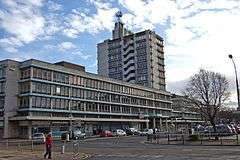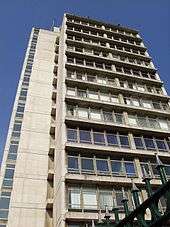Kingston House, Kingston upon Hull
| Kingston House | |
|---|---|
 Kingston House | |
| General information | |
| Architectural style | Modernist |
| Address | Kingston House, Bond Street, HU1 3ER |
| Town or city | Kingston upon Hull |
| Coordinates | 53°44′46″N 0°20′21″W / 53.746158°N 0.339039°W |
| Construction started | 1965 |
| Construction stopped | 1967 |
| Technical details | |
| Material | Concrete |
| Floor count | 12 |
| Design and construction | |
| Architect | Edwin Maxwell Fry |
| Architecture firm | Fry, Drew and Partners |
Kingston House is a tower block and low rise office development built in Kingston upon Hull, UK in the 1960s in a modernist style.
History

Kingston House is a multi storey office development built 1965-7 to the design of Fry, Drew and Partners.[1][note 1] The building was one of a number of high or medium rise concrete buildings built in the city in the post Second World War period including the main building of Hull College, 'Telephone House' (Carr Lane), and the Hull Royal Infirmary, as well as numerous high rise tower blocks.[1]
Prior to the Hull Blitz bombing of 1941-5 the area contained buildings of a type common in the town area north of Queen's Dock, dating to before the 1850s. (The 'Georgian old town'.)[3] At the end of the war much of the street had been destroyed or was ruinous.[4] The facing Bond Street was widened in the late 1950s/early 1960s as part of an uncompleted redevelopment scheme.[5][6] The building was originally intended to form part of an (unbuilt) wider redevlopment in the area, including a hotel, shopping centre on the other side of Bond Street.[7]
The building consists of a low rise (3 storey) building with wings on either side (north and south) of a 12 storey tower block. The buildings were constructed using a concrete frame with infilled panels. The total site area is 3,147 square metres (33,870 sq ft) and the total floor area 11,416 square metres (122,880 sq ft).[8] Floor area per deck on the upper tower block (floors 5-12) was 417.4 square metres (4,493 sq ft).[9]
The modernist design fell out of favour during the latter half of the 20th century, and by the 21st century the building was often referred to as an 'eyesore;[7][10][11] In the Hull Pevsner architectural guide (Neave & Neave 1995) it is described as "uninspired".[12]
Office tenants included Humberside County Council (up to 1980), later Humberside Police, and after 1996 Hull City Council.[10]
In 2014 the council offered the building for sale after relocating staff based there as part of cost cutting exercises;[10] demolition and wider redevelopment were seen at the time as potential options for the site,[7] alternative plans (2015, withdrawn) included redevelopment of the buildings as apartments.[11]
As of 2014 the buildings were also used for various telecommunications equipment including aerial leases to Vodafone, Arqiva, Orange PCS, Cable and Wireless, and Everything Everywhere/Hutchinson 3G.[9]
Notes
- ↑ Edwin Maxwell Fry was the architect.[2] See also Jane Drew.
References
- 1 2 Neave & Neave 2010, p. 34.
- ↑ Emanuel, Muriel, ed. (1980), Contemporary Architects, FRY, p.265. cols.2-3
- ↑ Ordnance Survey 1:2500 1925; 1:1056 1856
- ↑ Ordnance Survey 1:2500 1948-9
- ↑ Pevsner & Neave 1995, pp. 544-5.
- ↑ Neave 2014, Slides 14, 26.
- 1 2 3 "Kingston House, high-rise eyesore in Hull city centre, set to be demolished for redevelopment", www.hulldailymail.co.uk, 4 January 2014
- ↑ nps 2014, p. 3.
- 1 2 nps 2014, p. 5.
- 1 2 3 "Transformation of 'eyesore' Kingston House in Bond Street step closer as council staff leave", www.hulldailymail.co.uk, 8 July 2015
- 1 2 "Setback over Kingston House eyesore as Hull City Council ends talks with developer", www.hulldailymail.co.uk, 25 October 2015
- ↑ Neave & Neave 2010.
Sources
- Neave, David; Neave, Susan (2010), "Hull", Pevsner Architectural Guides, Yale University Press, ISBN 978-0-300-14172-6
- Pevsner, Nikolaus; Neave, David (1995), "Yorkshire: York and the East Riding", The Buildings of England (2 ed.), ISBN 9780300095937
- Neave, David (13 May 2014), Post-War rebuilding of Hull 1945-1970 (PDF), RTPI Yorkshire, Guildhall, Hull
- Kingston House, Bond Street, Hull (DEVELOPMENT/REFURBISHMENT OPPORTUNITY) (PDF) (property listing), nps group, 2014
External links
| Wikimedia Commons has media related to Kingston House, Kingston upon Hull. |